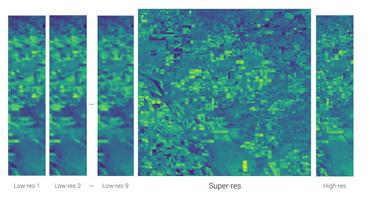Multi-Frame Super-Resolution
14 papers with code • 1 benchmarks • 3 datasets
When multiple images of the same view are taken from slightly different positions, perhaps also at different times, then they collectively contain more information than any single image on its own. Multi-Frame Super-Resolution fuses these low-res inputs into a composite high-res image that can reveal some of the original detail that cannot be recovered from any low-res image alone.
( Credit: HighRes-net )
Most implemented papers
Wide Activation for Efficient and Accurate Image Super-Resolution
Keras-based implementation of WDSR, EDSR and SRGAN for single image super-resolution
Handheld Multi-Frame Super-Resolution
In this paper, we supplant the use of traditional demosaicing in single-frame and burst photography pipelines with a multiframe super-resolution algorithm that creates a complete RGB image directly from a burst of CFA raw images.
Deep Burst Super-Resolution
We propose a novel architecture for the burst super-resolution task.
Multi-image Super Resolution of Remotely Sensed Images using Residual Feature Attention Deep Neural Networks
Convolutional Neural Networks (CNNs) have been consistently proved state-of-the-art results in image Super-Resolution (SR), representing an exceptional opportunity for the remote sensing field to extract further information and knowledge from captured data.
EBSR: Feature Enhanced Burst Super-Resolution With Deformable Alignment
We propose a novel architecture to handle the problem of multi-frame super-resolution (MFSR).
Deep Reparametrization of Multi-Frame Super-Resolution and Denoising
The deep reparametrization allows us to directly model the image formation process in the latent space, and to integrate learned image priors into the prediction.
DeepSUM: Deep neural network for Super-resolution of Unregistered Multitemporal images
This novel framework integrates the spatial registration task directly inside the CNN, and allows to exploit the representation learning capabilities of the network to enhance registration accuracy.
HighRes-net: Multi-Frame Super-Resolution by Recursive Fusion
Multi-frame Super-Resolution (MFSR) offers a more grounded approach to the ill-posed problem, by conditioning on multiple low-resolution views.
HighRes-net: Recursive Fusion for Multi-Frame Super-Resolution of Satellite Imagery
Multi-frame Super-Resolution (MFSR) offers a more grounded approach to the ill-posed problem, by conditioning on multiple low-resolution views.
Permutation invariance and uncertainty in multitemporal image super-resolution
However, existing models have neglected the issue of temporal permutation, whereby the temporal ordering of the input images does not carry any relevant information for the super-resolution task and causes such models to be inefficient with the, often scarce, ground truth data that available for training.


 BurstSR
BurstSR
 Inter4K
Inter4K
 PROBA-V
PROBA-V
